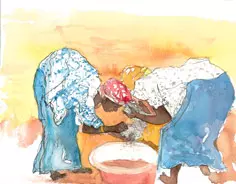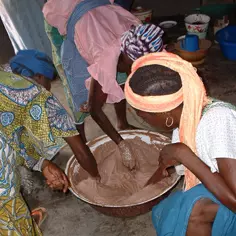
Social and Employment
Place
region of Ouagadougou, Burkina Faso
Sponsor
Alain Sgaronni
Grant(s)
20.000 € spread over two years to the Selection Committee at 2006/03/28
Project leader
Conseil environnement développement durable
« This project closely fulfills the principles of sustainable development and fair trading. Its challenges are social—fighting malnutrition, creating jobs, fairness, good working conditions, employee training—economic—to aid the development of the countries of the South—and environmental. »
Alain Sgaronni
Throughout the Sahel, women have known about the benefits of karite nut butter for decades. This 100% plant product prevents the dryness and aging of the skin and hair, in conditions of intense heat, sunlight, wind, etc. In recent years, this precious unguent has reached the cosmetology shelves of major European department stores, and is increasingly popular with consumers.
To help Zeems Taaba, the Burkina Faso association of 200 women from three villages of the region of Ouagadougou, develop their arts and crafts activities, producing soap and karite nut butter, the manager of Artisans du Monde in Nice contacted the association CEDD (Council of Environment and Sustainable Development), founded in 2001 by the students of the Planet Management Department of the University of Nice. The aim: to optimize the whole karite nut system of Zeems Taaba from production to distribution.
Fair biological certification
Throughout the year 2005, the students of CEDD therefore carried out a complete study of this economic activity, focusing on all the steps of the chain: manufacturing processes, technologies used, marketing, health and customs regulations. On completion of this task, they drew up a three-year action plan, to be developed with the women of Zeems Taaba, to make all the improvements they had identified.

For example, CEDD worked on communication and product marketing, and on the equipment used to enhance production quality. It also involved Zeems Taaba in a biological certification approach with Ecocert to bring added value to the marketed products, and it helped it to compile a file for a reference with the Solidar'monde central purchasing agency specialized in fair trading.
These two projects will inject a new dynamism into the distribution of the products and guarantee satisfactory income to the producers. CEDD also plans to train managers in the three villages to manage production, equipment replacement, the creation of a store and a snack bar on one of the sites.
Approached alongside the French Ministry of Foreign Affairs, the principality of Monaco and the University of Nice, the Veolia foundation has granted 20 000 euros to CEDD to finance the installation of the future store.

